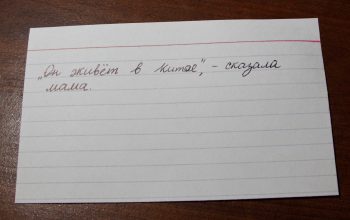Tag Archives: Russian punctuation
Are conjunctions necessary? Part II Posted by bota on Apr 5, 2021

We’ve talked about Russian sentences without conjunctions before, but we’ve yet to discuss my favorite Russian punctuation sign “тире́” (dash) and its role in these бессою́зных предложе́ниях (sentences without conjunctions). There are six instances where you can use “тире́” (dash; typed as an m-dash sign) in place of a conjunction. I’ll provide examples for each…
Are conjunctions necessary? Posted by bota on Mar 23, 2021

Если… а… но… Three perhaps most commonly used сою́зов в ру́сском языке́ (conjunctions in Russian), aside from “и”, and exactly how much I got to say as a kid when trying to convince my parents to get me дома́шнего пито́мца (a pet). It usually went like this: Since then, some things stayed the same – my parents…
Tricky Russian Typography – Part II Posted by Maria on Sep 26, 2016

Last time, we started talking about punctuation that may be tricky to enter for Russians primarily used to handwriting; specifically, we covered direct speech. We are continuing to some other tricky cases. Dash At least in the US, a lot of attention is paid to distinguishing hyphens from n-dashes from m-dashes and the proper use…
Tricky Russian Typography – Part I Posted by Maria on Sep 21, 2016

We have talked about keyboarding in Russian and some peculiarities of Russian punctuation on this blog. Let us expand on these subjects with an overview of characters that may not be easy to enter on a keyboard. Generally speaking, until very recently Russian literacy dwelled primarily in the handwritten domain. That is, of course, books…
Comma Abuse in Russian Posted by Maria on Aug 25, 2014
We are often so concentrated on the various skills involved in the mastery of a language that punctuation tends to fall by the wayside. In the absence of any other guidance, we rely on our own language in our writing, but that may sometimes prove wrong. I would like to point out several aspects of…


